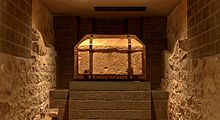Matthias (apostle)
The Jewish scribe Matthias ( ancient Greek Ματθίας Matthias , Hebrew name מתיתיהו Matityahu, Mattithiah , Latin Matthias ; † around 63 , probably in Jerusalem ) was a disciple of Jesus . After the death of Judas Iscariot , he was added to the remaining eleven apostles of Jesus ( Acts 1.15–26 EU ). He is therefore considered the twelfth apostle , a rank that is, however, also assigned to Paul of Tarsus .
New Testament tradition
According to the story of the Acts of the Apostles , Matthias was chosen by lot ( Acts 1.15–26 EU ). He replaced Judas , who had taken his own life out of desperation over the betrayal he had committed against Jesus ( Acts 1,23-26 EU ). There are no further references to the apostle in the New Testament. The name means "gift of YHWH " (God).
Old church tradition

The early church Christian tradition is not unanimous on the question of whether the original, religious-historical (the twelve tribes of Israel) significant twelve number is restored by him or by Paul . Unlike in the case of Matthias, his figure is linked to an immediate history of calling ( Acts 9 : 1-22 EU (report) and Gal 1.13-17 EU (self-testimony)), but he did not belong to the followers of Jesus. This wavering explains why Matthias is sometimes referred to as the thirteenth apostle .
There are different representations about the circumstances of Matthias's death. In the Legenda aurea , Jacobus de Voragine reports that he died in peace and that his body was brought from Judea to Rome. According to another tradition he suffered in Jerusalem the martyr when he was stoned or beheaded.
Clement of Alexandria mentions Matthias in his reflections on the Apostle ministry (in Book VI of the Stromateis , Chapter XIII):
“Not that they were chosen to be apostles because of the excellent qualities of their nature, for Judas was chosen along with them. But they were able to become apostles because they were chosen by Him who foresaw even the final questions. Matthias, accordingly, who was not chosen together with them, showed himself worthy to become an apostle, is a substitute for Judas. "
Apostle grave in Trier
According to legend, the bones of the apostle Matthias are said to have been found in Palestine more than 250 years after his death on behalf of Empress Helena , mother of the Roman Emperor Constantine I , and transferred to Trier by the Trier Bishop Agritius . In 1127 human bones that were found in the Benedictine Abbey of St. Matthias in Trier were regarded as the relics of the apostle Matthias, which had been lost for centuries . They have been venerated by pilgrims in the abbey church ever since. The Matthias cult was particularly lively in the Middle Ages. A brotherhood book with 4670 entries from the middle of the 12th century to the beginning of the 13th century attests to the number of pilgrims. Pilgrims from the Rhineland in particular come to Trier during the pilgrimage season. Many set out on foot. These pilgrimages are carried out by St. Matthias Brotherhoods.
iconography
The attribute of the apostle in traditional iconography is the book (for his apostolic office) or the hatchet or the halberd (for his martyrdom). In the crowd of apostles he can only be seen in scenes of the biblical story after Christ's ascension, namely at Pentecost and the death of Mary. In groups of apostles he is usually replaced by Paul, who is considered the twelfth apostle here. Both Paul and Matthias are shown less frequently, so that the number of apostles increases to thirteen.
Memorial days
- Evangelical: EKD (memorial day according to the evangelical church service book) and LCMS : February 24th (in leap years February 25th), ELCA : May 14th
- Catholic: early February 24th (VI Kal. Mart. - in leap years it was February 25th); in the liturgical reform moved from Lent to May 14th ( festival in the general Roman calendar )
- In the German-speaking area, February 24 (festival in the regional calendar for the German-speaking area ) continues to apply , because this day is particularly rooted here (Trier)
- in Trier also: transfer of the bones on July 18th and the celebration of Matthias' election as apostle on May 7th
- Anglican: February 24th or May 14th
- Orthodox: August 9th
- Coptic: March 4th
Others
The apostle Matthias is the protagonist in Wilton Barnhardt's novel Gospel (New York 1993), the German translation of which was published under the title The Thirteenth Apostle (Munich 1994).
Patronage
literature
- Johannes Lütticken OSB: Matthias. Apostle of Faithfulness. In: Michael Langer (ed.): Light of the earth. The Holy. 100 great stories of faith. Pattloch, Munich 2006, pp. 120–122.
Web links
- Matthias - Ecumenical Lexicon of Saints
- Arch brotherhood to St. Matthias
- St. Matthias Brotherhood Büttgen
- St. Matthias Brotherhood Anrath and pilgrimage for young people
- St. Matthias Brotherhood Neuwerk
Individual evidence
- ↑ See Stanley A. Shepherd: The Stained Glass of AWN Pugin . Spire Books, Reading 2009, ISBN 978-1-904965-20-6 , pp. 418 .
- ^ Feast and Festivals - The Lutheran Church — Missouri Synod . LCMS website. Retrieved March 4, 2012.
| personal data | |
|---|---|
| SURNAME | Matthias |
| ALTERNATIVE NAMES | Apostle Matthias |
| BRIEF DESCRIPTION | Apostle, scribe |
| DATE OF BIRTH | 1st century BC BC or 1st century |
| DATE OF DEATH | at 63 |


